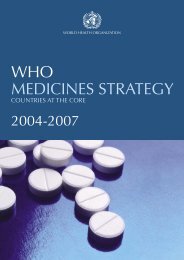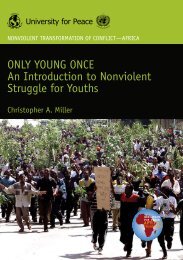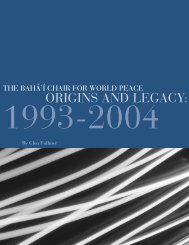environmental degradation as a cause of conflict in - Steiner Graphics
environmental degradation as a cause of conflict in - Steiner Graphics
environmental degradation as a cause of conflict in - Steiner Graphics
Create successful ePaper yourself
Turn your PDF publications into a flip-book with our unique Google optimized e-Paper software.
Zal<strong>in</strong>gei <strong>in</strong> the southwest with c<strong>as</strong>h crops such <strong>as</strong> mangoes and oranges dest<strong>in</strong>ed forthe markets further e<strong>as</strong>t. It w<strong>as</strong> only <strong>in</strong> the mid-1960s that Darfurians, both Araband non-Arab, began to enter the national political arena and <strong>as</strong>sert their own identity.The Darfurians tended to vote <strong>in</strong> democratic periods for Umma Party (whichgrew out <strong>of</strong> the Mahdist movement <strong>of</strong> the late n<strong>in</strong>eteenth century), although thetowns usually voted for the Democratic Unionist Party (l<strong>in</strong>ked to the Khatmiyya Sufibrotherhood), although there w<strong>as</strong> general dissatisfaction with what w<strong>as</strong> seen <strong>as</strong>Khartoum’s neglect <strong>of</strong> the region, which found its expression <strong>in</strong> the Darfur DevelopmentFront established <strong>in</strong> 1966. When I first went to Darfur <strong>in</strong> 1968 members <strong>of</strong> therul<strong>in</strong>g elite made a conscious decision to help me with my fieldwork, provid<strong>in</strong>g mewith <strong>in</strong>formants and documents —a fact that I did not discover until many yearslater (<strong>in</strong> 1994 <strong>in</strong> fact). They wanted their history told.In the 1970s matters began to change; the military coup under Ja’far al-Numayribrought to power <strong>in</strong> the Sudan a regime which w<strong>as</strong> a comb<strong>in</strong>ation <strong>of</strong> young pan-Arabists, many Ba’th-<strong>in</strong>fluenced, Communist sympathisers and <strong>in</strong>dependent <strong>in</strong>tellectuals.It w<strong>as</strong> an excit<strong>in</strong>g time to be <strong>in</strong> the Sudan; it w<strong>as</strong> also <strong>in</strong> h<strong>in</strong>dsight adis<strong>as</strong>trous time, especially for Darfur. Why Darfur? One <strong>of</strong> the al-Numayri’s ‘YoungTurk’ objectives w<strong>as</strong> modernisation—trivially, but significantly, illustrated by thefemale traffic police, <strong>in</strong> their snazzy white uniforms at the end <strong>of</strong> Sharia al Q<strong>as</strong>r;my students were both confused and f<strong>as</strong>c<strong>in</strong>ated. More serious w<strong>as</strong> the determ<strong>in</strong>ationto end all remnants <strong>of</strong> the colonial era. One <strong>as</strong>pect <strong>of</strong> this new policy w<strong>as</strong> thenationalization <strong>of</strong> bus<strong>in</strong>esses owned by expatriate communities, Armenians, Greeks,Copts and others—an imitation <strong>of</strong> ’Abd al-N<strong>as</strong>ir’s policies that worked poorly <strong>in</strong> theSudan. Another <strong>as</strong>pect meant the end <strong>of</strong> <strong>in</strong>direct rule, <strong>of</strong> ‘tribalism’ and ‘sectarianism’.In Darfur, the most <strong>in</strong>directly-ruled prov<strong>in</strong>ce <strong>of</strong> the Sudan and where the sultanicsystem w<strong>as</strong> more or less <strong>in</strong>tact, this translated <strong>in</strong>to the abolition <strong>of</strong> the Nativecourts and the end <strong>of</strong> chiefly rule. The problem w<strong>as</strong> that the old order, with rootsgo<strong>in</strong>g back over several hundred years, w<strong>as</strong> uprooted, while what replaced it neverreally functioned. How misguided this policy w<strong>as</strong> to be shown <strong>in</strong> the 1980s.One <strong>of</strong> the root <strong>cause</strong>s <strong>of</strong> the present crisis goes back to the mid-1980s whenprolonged droughts speeded up the desertification process <strong>in</strong> northern and centralDarfur, which <strong>in</strong> turn led to much pressure on water and graz<strong>in</strong>g resources, <strong>as</strong> thecamel nomads were forced to move southwards and become farmers. This <strong>in</strong>tensifiedpressure on graz<strong>in</strong>g and water. Conflicts over wells, that <strong>in</strong> earlier times weresettled with spears or, hopefully, mediation by elders or religious figures, becamemuch more <strong>in</strong>tractable when the area started to become aw<strong>as</strong>h with guns, largelybrought <strong>in</strong> from Chad or Libya.The militarization <strong>of</strong> the crisis h<strong>as</strong> grown ever s<strong>in</strong>ce Sadiq al-Mahdi while PrimeM<strong>in</strong>ister <strong>in</strong> the mid-1980s took the dis<strong>as</strong>trous decision to give arms to the Baqqara<strong>of</strong> southern Darfur ostensibly to defend themselves aga<strong>in</strong>st the Sudan Peoples Lib-26











